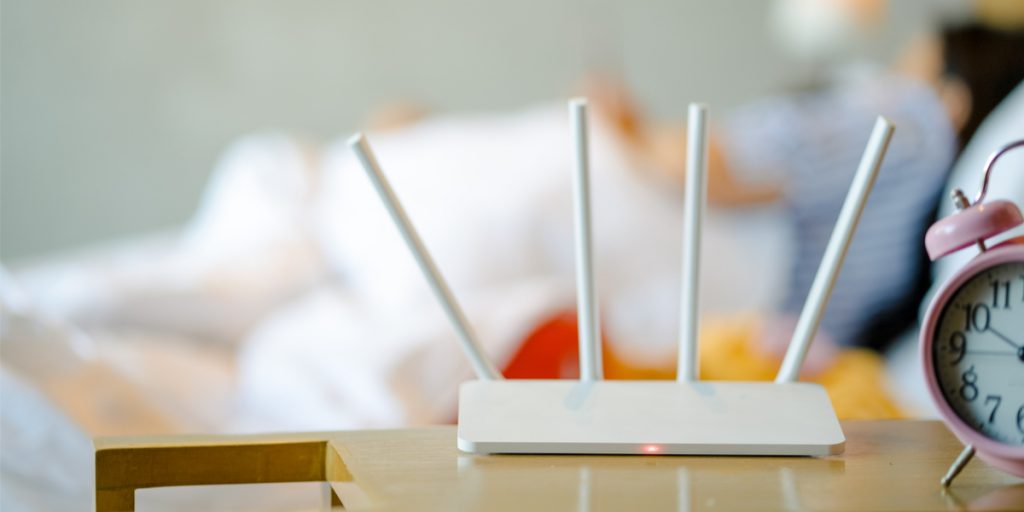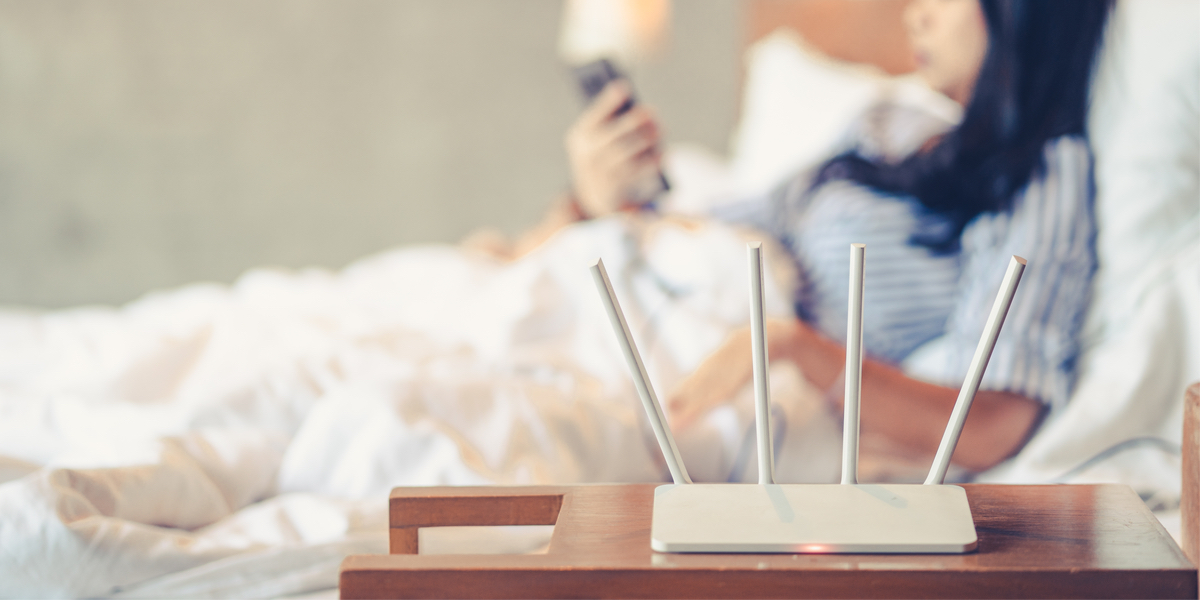Business and leisure are so strongly linked to the internet that the majority of homes with the ability to go online are doing so through a wireless router.
If you think about it, you’re probably using your router on a daily basis, working from home, browsing the net on your cell phone or streaming movies.
Additionally, placement of the router is typically done out of convenience, likely for increased signal strength. This means for many people, their Wifi router is in their bedroom, or perhaps in an office adjacent to their bedroom, which puts them in proximity to the energy output of the device.
If you live in an apartment building, the walls between you and your neighbor aren’t likely thick enough to block their Wifi either — consider how far away those routers are that you can still connect to. This article will examine if it’s safe to sleep near a Wifi router, and how you can protect yourself and your loved ones.
How does Wifi work?
Wifi is a radio frequency that transmits information wirelessly.
Your computer/laptop, phones, tablets — these all have Wifi connections in them that allow for the reception and use of these radio waves and frequencies.
This is important because most wifi routers only have a range of about 100 meters — this usually covers most houses, and a solid range around your home as well.
Projecting in 2.4 GHz and 5 GHz frequencies (this high frequency has many adverse effects, check here), these fall into the electromagnetic field range.
EMFs have been linked to negative health consequences, even in small but constant doses.
Recommended EMF Protection Products
- TriField EMF Meter Model TF2 (Amazon) – measures the 3 different types of EMF radiation, including RF radiation from routers and cell phones
- Wifi Router Guard Cover (Amazon) – blocks up to 90% of EMF radiation from router using a Faraday cage
- Smart Meter Guard Cover (Amazon) – blocks up to 98% of EMF radiation emitted from your smart meter
- EMF Protection Underwear for Men & Women – Lambs uses WaveStopper technology to block 99% of UV and Wireless Radiation.
- EMF Protection T-Shirts for Men & Women – Lambs independently lab tested material blocks 99% of UV and Wireless Radiation
What effect does Wifi have on health?

Your router might have a larger effect on your daily life than you know.
Studies have shown a variety of short term and long term effects, ranging from mild to potentially life-altering. It may have some adverse effects like preventing our good night’s sleep and strains on our eyes.
Scientific evidence shows that most routers don’t have any prevention system to block emf radiation. So having a wifi router in your bedroom may open the flood gate of radiation exposure if there’s no wifi router guard.
Wireless routers or wifi routers can be used with a small emf protection canopy. But it’s better not to have wifi router in your bedroom because due to high radio frequency radiation our human body impart some negative effects on our overall mental and physical health. Health impacts like trouble sleeping, headache, alteration of our body clock system etc are major.
A few studies (not scientifically accepted yet) suggest exposure to non ionizing radiation from wi fi routers, cell phone or other devices even it’s on airplane mode stimulate the elements responsible for human carcinogen.
The largest problems that routers seem to pose is that the effects of saturation are cumulative.
Because of this, being constantly exposed can leave you at greater risk.
Some studies show the following potential health impacts that Wifi creates:
- Apoptosis, or cellular death. While this is something that occurs all the time in humans, it’s not something we want outside sources doing. Cell death occurs naturally as our bodies recycle old material. But when external forces cause cell death, it can only occur through damage. Repeated damage — of any kind — increases your risk of developing certain cancers.
- Sperm count reduction is a commonly reported side effect of constant exposure to Wifi signals. Some participants in various studies have not only had reductions in sperm count but also motility.
- Oxidative stress, which is effectively cellular damage. Again, this could potentially lead to cancer if exposure occurs over a long enough period.
- Sleep disruption from altered melatonin is another common influence of being exposed to Wifi. Part of the overall problem is that we never turn our routers off; even when we’re sleeping and not using the internet, our routers are still sending out signals. Those EMF waves can disrupt your sleep, which leads to cell damage and impaired cellular repair.
The International Agency for Research on Cancer (IARC), part of the World Health Organization works to find causes of cancer.
In 2011 they classified RF EMF radiation as a Group 2B Possible Human Carcinogen (1). Many researchers, scientists and doctors who work in the field of electromagnetic radiation are pushing the IARC to upgrade the risk to a Group 1 Known Carcinogen.
Swedish oncologist and professor Lennart Hardell and scientist in the Department of Oncology at Örebro University Hospital Michael Carlberg published a paper in the International Journal of Oncology.
They state the IARC should classify RF radiation as Group 1 in their conclusion:
“There is clear evidence that RF radiation causes cancer/tumor at multiple sites, primarily in the brain (glioma) and head (acoustic neuroma). There is also evidence of an increased risk of developing other tumor types. The results are similar in both the NTP studies and the Ramazzini Institute findings. Based on the IARC preamble to the monographs, RF radiation should be classified as Group 1: The agent is carcinogenic to humans.”
(2)
Similarly a group of epidemiologists supported the conclusion that the IARC should upgrade the risk to Group 1. (3)
Is it safe to sleep near a Wifi router?
Ultimately, it’s not safe to sleep near a router.
You might be exposed to Wifi output all day as you go about your life. But you’re constantly moving in and out of the strongest frequencies.
In physics, the inverse square law essentially states that the farther you are away from the source of energy, the less effect that energy has on you.
This is the same for heat, magnets, gravity, light and radiation of other types.
This is a good reason to put your router in an unfrequented room. And as far away from your bedroom as possible.
The signal might not be as good. But proper sleep hygiene tells us that we shouldn’t be using our phones in bed anyway. The blue light makes it harder for us to fall asleep.
So, it’s better to turn of wifi while sleeping. It’s good for our health and for the machines too.
Keeping high frequency routers near baby crib is also not recommended. There’re multiple reasons why we should avoid doing this check here.
Proximity to a router and insomnia – Does Wifi Affect Sleep?
Being closer to a router can influence melatonin and thus affect sleep.
As we talked about before, reduced sleep quality affects everything in the human body, from concentration to cellular repair and your immune system.
Beyond basic steps of improving your bedtime routine, like stopping all other electronic devices you use about an hour before you go to sleep, moving away from the router is critical.
For many people, simply moving the router out of their bedroom will have a profound effect on the quality of their sleep. But moving it across the house can be even more beneficial.
Ways to reduce Wifi exposure
Now before you go and throw away your router and jump back to connecting to the internet with a 56k modem, there are solutions to Wifi exposure.
Most of these fixes are perfect for mitigating the potential negative effects of the router and can be done quickly and easily.
- Use a high quality wifi router guard to reduce RF radiation by about 90%
- Follow the inverse square law and move your router. Simply putting it a few rooms away from the sleeping areas in your home is enough to make a profound impact. Your best bet is to move it to the room where people are least likely to be for long periods of time.
- Turning your router off at night will completely stop the saturation of Wifi signals during your sleep. This is a great way to not only prevent over-exposure to EMFs but also to save some money on electricity.
- Additionally, you can try turning your devices onto airplane mode when you’re sleeping. If they’re not drawing Wifi, the rate of transmission to your immediate area should be lessened.
- Grounding is a method of discharging positive ionic charges that you gain through interaction with EMFs and other electronics. Basically all you have to do is go find yourself a patch of earth and stand on it barefoot. This is of course the simplest version. But the belief is that the earth has a slightly negative charge. By grounding, you’re able to discharge the positive ions stored in your body. Regardless of whether the ionic concept is true or not, grounding has been scientifically proven to be healthy, so it’s worth a try.
- You could try switching to a hard connection with Ethernet cables. I recently wrote an article on installing wired internet throughout your house – even the second story.
Is it Safe to Have Wifi Extender in Your Bedroom?
A wifi extender or booster is intended to extended wifi coverage and it can be used with wireless devices, a cable modem or a wireless router.
In the case of a wireless router, it is not safe to have an extender in your bedroom for the same reasons you don’t want to have a router in your bedroom – consistent exposure to radio frequency (RF) EMF can have negative consequences to your health.
However, if the extender is simply using coaxial cable or an ethernet cable, that will not emit the RF radiation that comes from Wifi.
Mitigate your family’s exposure to Wifi
Even if you don’t commit to Ethernet cables or the dial-up, screeching modems of the 90s, you should still be doing what you can to mitigate Wifi EMF exposure.
The good news is that it’s exceedingly simple to change a few things and protect your family. Simply moving the router along can improve your sleep and reduce your exposure. Take the time to ground yourself, and unplug every once in a while — you might even find you don’t need to be constantly connected after all. So, keep using high speed wifi routers with proper protective measures by blocking emf radiation.
References
(1) World Health Organization – IARC (International Agency for Research on Cancer). Non-ionizing Radiation, Part 1: Static and Extremely Low-frequency (ELF) Electric and Magnetic Fields.
(2) Hardell L and Hardell L: Comments on the US National Toxicology Program technical reports on toxicology and carcinogenesis study in rats exposed to whole-body radiofrequency radiation at 900 MHz and in mice exposed to whole-body radiofrequency radiation at 1,900 MHz. Int J Oncol 54: 111-127, 2019
(3) Miller AB, Morgan LL, Udasin I, Davis DL. Cancer epidemiology update, following the 2011 IARC evaluation of radiofrequency electromagnetic fields (Monograph 102). Environ Res. 2018 Nov;167:673-683
(4) Genuis SJ. Fielding a current idea: exploring the public health impact of electromagnetic radiation. Public Health. 2008 Feb; 122(2):113-24.
(5) Havas M. Electromagnetic hypersensitivity: biological effects of dirty electricity with emphasis on diabetes and multiple sclerosis. Electromagn Biol Med. 2006;25(4):259-68.
(6) Philips, A. Brain Tumours: Rise in Glioblastoma Multiforme Incidence in England 1995–2015 Suggests an Adverse Environmental or Lifestyle Factor. 2018
(7) Pall, M. Wi-Fi is an important threat to human health. 2017.
(8) Heffner, C. BioNews. 2019
(9) Zhao, Z., Zhao, X., & Veasey, S. C. (2017). Neural Consequences of Chronic Short Sleep: Reversible or Lasting?. Frontiers in neurology, 8, 235.


